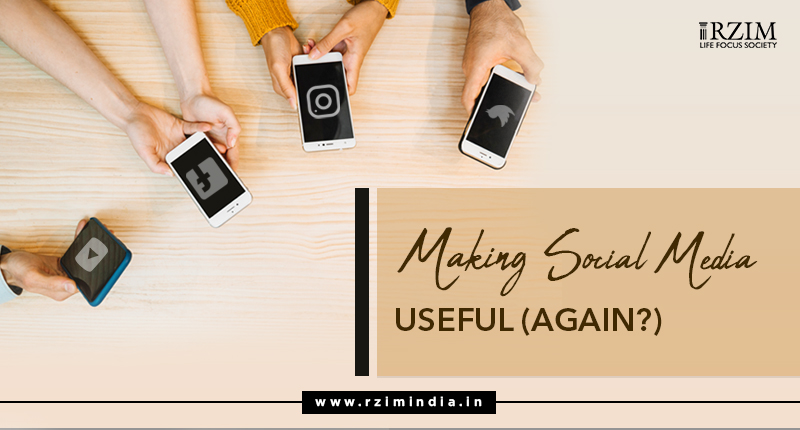Making Social Media Useful (Again?)

by Dr Jamila Koshy
Social media (SM) has many benefits – quick, cheap and in some ways, improved communication with family, friends, government agencies, and other; a large amount of information; ease of access. Social media is an integral part of our lives.
Yet, negotiating social media can be difficult. They throw up several problems – SM can be addictive and time-consuming. They can be destructive and divisive socially. They can harm people psychologically.
SM takes up a lot of our time, which could be better spent on building real relationships or developing our skills. Yesterday, I noticed a family seated in a Chennai restaurant. All three were scrolling on their phones, only stopping when their meal arrived. We’ve all rued time spent mindlessly on YouTube, or Instagram or Facebook. The novelty and the stimuli work to produce an effect similar to the high from a drug , with prolonged usage perhaps leading to changes in brain activity and chemistry (the study of which is still in its infancy). This is something that needs to be discussed more.
SM can also be full of negativity and ill-will, dividing people and communities. The anonymous platforms are the worst. Trolling others has become passe; barbed, hate-filled or bitingly sarcastic comments and arguments are common; rape threats and death threats appear with regularity. Fake news is another huge problem; often politically and communally motivated, it has caused humongous disturbances. North-east people fled to the South in 2012 on rumours of harm. Fake child-lifting rumours on WhatsApp have led to the tragic deaths of over 30 people in the last few years.
SM can harm individuals too. They create psychological problems. People often get depressed when on SM for long. They question their own life, and experiences in contrast to the apparently joyous and adventurous lives of their friends. They can get narcissistically obsessed with self-portraits and painting an often false picture of their life to others. They can ignore their real-life relationships in an attempt to document their own lives obsessively or follow their heroes. They can follow the herd blindly, not stopping to process or choose for themselves.
How then does one navigate this space?
Enter SM with your faith, ethics and morals and hang onto them. Be conscious always that you are interacting with real, live people, though their bodies and faces do not appear in the room near you. Be as polite and respectful to them as you would like them to be with you.
Keep an eye on the time. Being aware of how much time one spends on SM itself may help us to realise how habituated we have become. Using alarm clocks to remind ourselves and cut down usage to a reasonable time is a good way to begin controlling ourselves.
Limit your screen in your own way – some people find three or four times a day sufficient. If you find yourself checking the phone every few minutes – we’ve all been there! – give your phone to someone for a day or more and deliberately do something else. You’ll find you enjoy it immensely. If you find night is the most difficult period for control, again, give your phone to someone else for a day and experience a night with a book, or a chat with your spouse or sibling. Make sure you are in control of your phone, and social media, and if you ever sense it getting control of you, put it away where you can’t access it for a while, so that you regain control. Be aware and honest with yourself.
Destructive interactions on SM can be dealt with in different ways depending on the severity and frequency of it. You may choose to ignore an occasional rude remark. Responding with humour, light satire, and light-heartedness can be very effective. Occasionally you may need to block someone , or report an inappropriate remark or serious threat. Do it carefully and thoughtfully.
It goes without saying that you should never be the person to initiate troll behaviour. Be polite to even those you don’t agree with, or those who have in the past, trolled you. Choose your words carefully even when critiquing something or someone you don’t admire. What you say and how you say it will reflect on your faith, your character.
We need to ensure we don’t contribute to fake news. Responsible and honest users should check the date of news videos they post, especially if they report persecution, threats and so on. Avoid forwarding bizarre or hate-filled or unsubstantiated posts. Check whether the post has been reported by several reputable sites. Fake news often comes from a single source. Check for obvious photo-shopping or change of the voice-track – often obvious through not-in-sync lip movements.
Ensure that you are not being harmed emotionally. Check what SM makes you think of yourself and others. If you are often upset or angry after interacting, reading posts, or begin hating yourself, or others, be sure something is wrong. Take a break of several days. Don’t worry, nothing will be lost! Question those thoughts and feelings, and instead steep yourself in what uplifts your spirits and makes you feel positive about yourself and others. Create something. Take a walk. Play with your cat. Do something nice for your mother or sister.
Is it allright to post under a false name or handle? Some may choose to do so for privacy or safety. However, be careful not to create a fake profile of persona, under which you ‘let loose’; some of such handles spout venom and hate, secure that they will not be found out. Be aware of these temptations to allow the worst part of ourselves free reign. While it may give a temporary feeling of power, such behaviour is dangerous for your own self-image, self-esteem and can create severe problems with others as well. If you have done any of these things, then stop and think what motivated you. If you need to talk, find a psychiatrist or psychologist whom you trust, to help you.
SM can be very useful in moderation. It can help us connect with people and get involved or learn many new things. However, basic rules of loving and respecting others and yourself would keep social media useful as well as pleasant for all.
————–
Dr Jamila Koshy is a well-known psychiatrist based in Chennai.


There are no comments